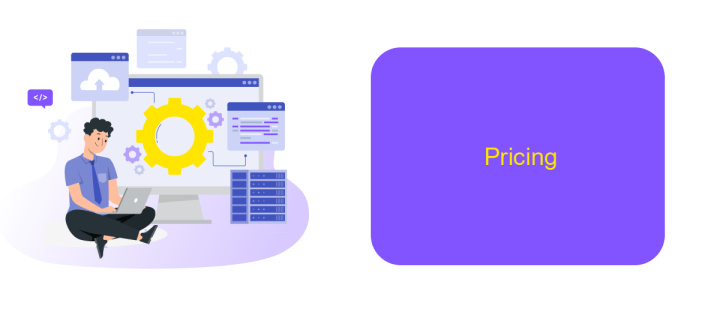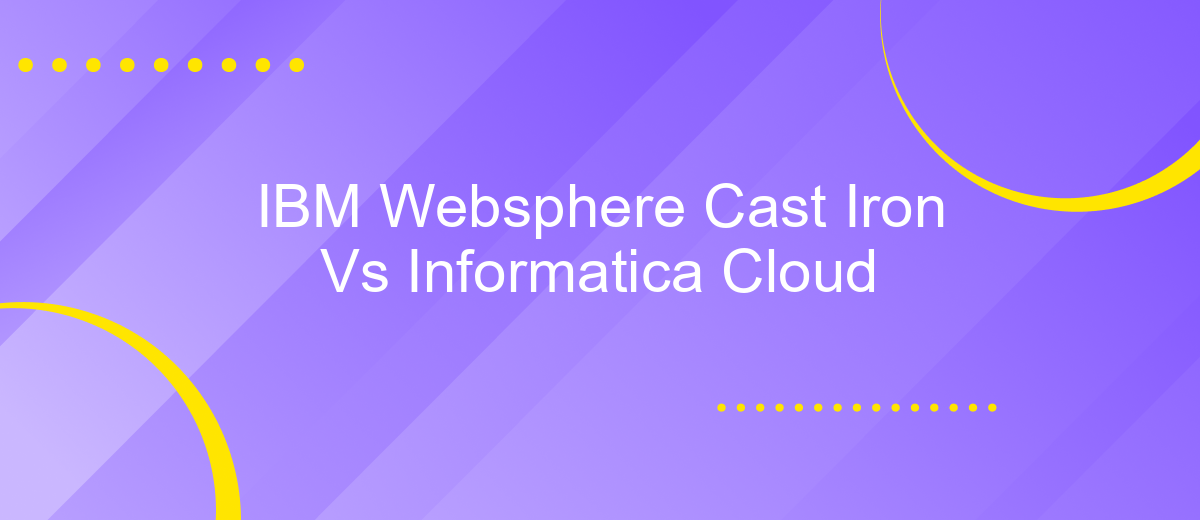IBM Websphere Cast Iron Vs Informatica Cloud
In the rapidly evolving landscape of cloud integration, choosing the right platform is crucial for seamless data management. This article compares IBM WebSphere Cast Iron and Informatica Cloud, two leading integration solutions. We'll explore their features, performance, and ease of use to help you determine which platform best meets your organization's needs for efficient and effective cloud integration.
Overview
IBM Websphere Cast Iron and Informatica Cloud are two prominent solutions for cloud integration and data management. Both platforms offer robust capabilities to streamline and automate business processes, enabling seamless data flow across various applications and systems.
- IBM Websphere Cast Iron: Known for its rapid integration capabilities, it provides pre-configured templates and a user-friendly interface to connect cloud and on-premise applications effortlessly.
- Informatica Cloud: Offers comprehensive data integration tools, including data synchronization, replication, and transformation, making it suitable for complex data environments.
When comparing these platforms, it's essential to consider the specific needs of your organization. For instance, if you require a solution that emphasizes ease of use and quick deployment, IBM Websphere Cast Iron might be the better choice. Conversely, if your focus is on extensive data management and transformation capabilities, Informatica Cloud could be more suitable. Additionally, services like ApiX-Drive can further enhance your integration processes by providing additional automation and connectivity options, ensuring a more cohesive and efficient workflow.
Key Features

IBM Websphere Cast Iron offers a robust platform for integrating cloud and on-premises applications with minimal coding. It features pre-built templates and a user-friendly interface that simplifies the integration process, making it accessible even for non-developers. Additionally, it provides real-time data synchronization and supports a wide range of protocols and applications, ensuring seamless connectivity across various systems.
Informatica Cloud, on the other hand, excels in providing scalable and secure data integration solutions. It offers advanced data transformation capabilities and supports extensive data governance and compliance features. With its intuitive drag-and-drop interface and rich library of connectors, Informatica Cloud allows users to quickly set up complex integrations. For those looking for additional integration capabilities, services like ApiX-Drive can further enhance the flexibility and efficiency of your data workflows, offering easy-to-use tools for automating and managing integrations across multiple platforms.
Comparison

When comparing IBM Websphere Cast Iron and Informatica Cloud, it's essential to consider their key features and capabilities. Both platforms offer robust integration solutions, but they cater to different needs and preferences.
- Ease of Use: Informatica Cloud provides a user-friendly interface with drag-and-drop functionality, making it accessible for non-technical users. IBM Websphere Cast Iron, while powerful, has a steeper learning curve and is more suited for technical users.
- Integration Capabilities: IBM Websphere Cast Iron excels in complex, on-premise integrations, offering extensive support for various protocols and data formats. Informatica Cloud, on the other hand, shines in cloud-based integrations, providing seamless connectivity with popular SaaS applications.
- Deployment Options: Informatica Cloud offers flexible deployment options, including cloud, on-premise, and hybrid environments. IBM Websphere Cast Iron primarily focuses on on-premise and hybrid solutions, with limited cloud deployment capabilities.
Both IBM Websphere Cast Iron and Informatica Cloud have their strengths and weaknesses, making them suitable for different scenarios. For businesses looking for a more cloud-centric solution, Informatica Cloud is a better fit. However, for those requiring robust on-premise integration capabilities, IBM Websphere Cast Iron is the preferred choice. Additionally, services like ApiX-Drive can further simplify the integration process by offering pre-built connectors and automation tools.
Pricing

When comparing the pricing models of IBM Websphere Cast Iron and Informatica Cloud, it is essential to consider the unique needs and scale of your business. IBM Websphere Cast Iron offers a more traditional pricing structure, typically based on licensing fees and additional costs for support and maintenance. This can be beneficial for larger enterprises with a dedicated budget for integration solutions.
Informatica Cloud, on the other hand, offers a more flexible and scalable pricing model. It often operates on a subscription basis, allowing businesses to pay for what they use. This can be particularly advantageous for smaller companies or those with fluctuating integration needs.
- IBM Websphere Cast Iron: Licensing fees, support, and maintenance costs.
- Informatica Cloud: Subscription-based, pay-as-you-go model.
For businesses looking for an alternative or supplementary integration solution, ApiX-Drive offers a cost-effective and user-friendly option. With its transparent pricing and easy-to-use interface, ApiX-Drive can help streamline integration processes without the need for extensive technical expertise or large financial commitments.
Conclusion
In conclusion, both IBM Websphere Cast Iron and Informatica Cloud offer robust solutions for cloud integration, each with its unique strengths. IBM Websphere Cast Iron excels in providing powerful on-premise and cloud-based integration capabilities, making it ideal for enterprises with complex integration needs. Its extensive support for various protocols and applications ensures seamless data flow and process automation.
On the other hand, Informatica Cloud stands out with its user-friendly interface and comprehensive cloud data management features. It is particularly well-suited for organizations looking for a scalable and intuitive platform to manage their cloud integrations. Additionally, services like ApiX-Drive can further enhance integration efforts by offering streamlined connectivity and automation between different cloud services and applications. Ultimately, the choice between IBM Websphere Cast Iron and Informatica Cloud will depend on the specific requirements and preferences of the organization.
FAQ
What are the main differences between IBM Websphere Cast Iron and Informatica Cloud?
Which tool is better for real-time integration?
How do these tools handle data security?
Can I use these tools for integrating with non-cloud applications?
Are there services available to help with the automation and setup of these integrations?
Do you want to achieve your goals in business, career and life faster and better? Do it with ApiX-Drive – a tool that will remove a significant part of the routine from workflows and free up additional time to achieve your goals. Test the capabilities of Apix-Drive for free – see for yourself the effectiveness of the tool.

